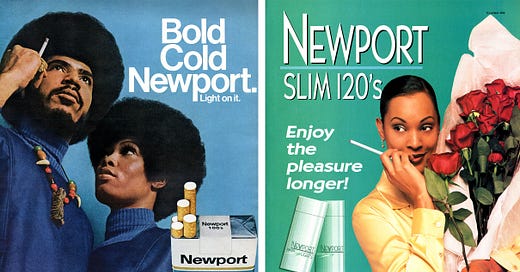Today’s Pulse covers the latest face-off between the FDA and Big Tobacco, after the FDA’s announcement to ban menthol cigarettes. Read on to learn more about how this new regulation could have a profound impact on racial equity in healthcare.
Today’s Pulse is 800 words, or a 6 minute read.
If you like what you read, make sure to drag the email to your “primary” tab!
HEALTH POLICYFDA to ban menthol cigarettes
The pulse:
Yesterday, the Food and Drug Administration (FDA) dealt a major blow to the tobacco industry by announcing that it plans to ban all menthol cigarettes and flavored cigars. You can bet Big Tobacco won’t be taking this one lying down.
What brought about this ban?
In 2013, several public health groups presented the FDA with a citizen petition. This is a process the FDA has created to allow individuals and communities to make requests for changes to health policy. The 2013 petition asked to prohibit menthol in cigarettes, stating there was “overwhelming scientific evidence” showing that menthol cigarettes were particularly harmful to their consumers. The FDA, it turns out, is like that one kid in class who asks for extensions on extensions. It only took them eight years, but despite intense pushback from the tobacco industry, the FDA has announced that a menthol ban will go into effect in the future.
Why the specific ban on menthol cigarettes?
There are two main reasons public health groups advocate for banning menthol. The first is menthol is highly implicated in hooking young smokers onto cigarettes – more than half (54%) of youth ages 12-17 who smoke use menthol cigarettes. They’re the only “flavored” cigarettes left on the market since the Family Smoking and Tobacco Prevention Act banned all other flavors back in 2009.
Menthol cigarettes are popular with young smokers because menthol cools and numbs the throat, reducing the harshness of cigarette smoke. Proponents of the ban argue that flavorless cigarettes would be less palatable to young smokers, some of who could potentially avoid a life-long tobacco addiction. Of course, to Big Tobacco, this would also mean losing life-long customers.
The other driving factor behind this ban is that menthol cigarettes disproportionately affect Black communities. Black smokers are far more likely to use menthol cigarettes than their white counterparts – nearly 85% of Black smokers use menthol cigarettes, compared with just 29% of white smokers. Much of this difference is due to very targeted marketing campaigns. For decades, tobacco companies specifically advertised menthol products in predominantly Black neighborhoods and in media outlets popular with Black audiences. Proponents of the ban believe prohibiting menthol products is a long overdue step towards racial equity.
Example of targeted marketing from Newport menthol cigarettes. Source: Washington Post
What effect could the ban realistically have?
According to Mitch Zeller, the director of the FDA’s tobacco center, a U.S. menthol ban could prompt 923,000 smokers to quit within two years of the ban, including 230,000 Black Americans. Evidence from other countries that have enacted similar menthol bans are promising. After Canada banned menthol products in 2017, one study found that 21.5% of menthol smokers quit smoking altogether.
Still, opponents of the ban argue that menthol smokers will be far more likely to switch to non-menthol cigarettes or to search for a “black market” for menthol cigarettes. The same study of former Canadian menthol cigarette smokers found that 59.1% switched to non-menthol cigarettes and another 19.5% found alternative ways to obtain menthols.
There will almost certainly be further pushback from tobacco companies. We can expect a legal challenge when the ban is formalized from companies such as R. J. Reynolds Tobacco Company, which produces Newport menthol cigarettes. Spokespeople from tobacco companies so far have firmly stated that the FDA does not have the legal justification to regulate menthol cigarettes differently than regular cigarettes. They have also questioned the validity of studies suggesting menthol cigarettes could be more addictive to youth or more harmful.
Menthol cigarettes currently make up 37% of the overall US cigarette market. If the ban were to go through, Big Tobacco stands to lose billions.
What’s the timeline?
There’s no clear timeline in place, but the ban will likely take quite some time to go into effect, accounting for legal pushback from tobacco companies and public comments. When the FDA proposed the menthol ban in 2013, more than 174,000 public comments were sent in. By law, the FDA has to read and consider each of these comments. In short, it could be years before this ban actually has an impact.
Bottom line it for me:
The FDA has taken a strong stance by proposing a ban against menthol cigarettes, which disproportionately affect youth and Black smokers. We can expect drawn out legal challenges from Big Tobacco on the horizon
.





